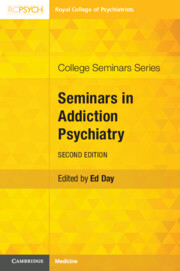Book contents
- Seminars in Addiction Psychiatry
- College Seminars Series
- Seminars in Addiction Psychiatry
- Copyright page
- Contents
- Contributors
- Preface
- Chapter 1 Historical and Conceptual Approaches to Addiction
- Chapter 2 Illicit Drug Use: Epidemiology, Aetiology and Prevention
- Chapter 3 Illicit Drug Use: Clinical Features and Treatment
- Chapter 4 Addiction to Prescription Medication: Benzodiazepines, Z-Drugs and Gabapentinoids
- Chapter 5 Alcohol Use Disorders: Epidemiology and Prevention
- Chapter 6 Alcohol Use Disorders: Aetiology and Pathophysiology
- Chapter 7 Alcohol Use Disorders: Clinical Features and Treatment
- Chapter 8 Psychological Approaches to Addiction
- Chapter 9 Comorbid Substance Use and Mental Illness
- Chapter 10 Medical Aspects of Drug and Alcohol Use
- Chapter 11 Organising Treatment Services for Drug and Alcohol Misusers
- Chapter 12 Tobacco Use Disorders
- Chapter 13 Novel Psychoactive Substances and Club Drugs
- Chapter 14 Addiction Problems in a Family and Social Context
- Chapter 15 Addiction Recovery Mutual-Aid Organisations
- Index
- References
Chapter 13 - Novel Psychoactive Substances and Club Drugs
Published online by Cambridge University Press: 02 November 2021
- Seminars in Addiction Psychiatry
- College Seminars Series
- Seminars in Addiction Psychiatry
- Copyright page
- Contents
- Contributors
- Preface
- Chapter 1 Historical and Conceptual Approaches to Addiction
- Chapter 2 Illicit Drug Use: Epidemiology, Aetiology and Prevention
- Chapter 3 Illicit Drug Use: Clinical Features and Treatment
- Chapter 4 Addiction to Prescription Medication: Benzodiazepines, Z-Drugs and Gabapentinoids
- Chapter 5 Alcohol Use Disorders: Epidemiology and Prevention
- Chapter 6 Alcohol Use Disorders: Aetiology and Pathophysiology
- Chapter 7 Alcohol Use Disorders: Clinical Features and Treatment
- Chapter 8 Psychological Approaches to Addiction
- Chapter 9 Comorbid Substance Use and Mental Illness
- Chapter 10 Medical Aspects of Drug and Alcohol Use
- Chapter 11 Organising Treatment Services for Drug and Alcohol Misusers
- Chapter 12 Tobacco Use Disorders
- Chapter 13 Novel Psychoactive Substances and Club Drugs
- Chapter 14 Addiction Problems in a Family and Social Context
- Chapter 15 Addiction Recovery Mutual-Aid Organisations
- Index
- References
Summary
This chapter looks at ‘club drugs’ and novel psychoactive substances (NPSs; previously known as ‘legal highs’). It examines the acute and chronic adverse health effects of these drugs and focuses in particular on their effects on mental health, including their dependence liability and associated withdrawal symptoms. The chapter is based on the best available research evidence on NPSs, which is currently limited, but nonetheless broadly consistent. It also provides practical patient case studies to illustrate key clinical points. Overall, the evidence suggests that interventions aimed at NPSs must be based on the guiding principles and national guidelines used for the management of substance misuse in general. However, NPSs pose a number of additional challenges, which are highlighted in this chapter. This chapter also establishes a conceptual framework for NPSs, which is crucial in helping clinicians to navigate the hundreds of new substances detected in recent years while allowing them to drawn on their existing experience of substance misuse.
Keywords
- Type
- Chapter
- Information
- Seminars in Addiction Psychiatry , pp. 230 - 251Publisher: Cambridge University PressPrint publication year: 2021



